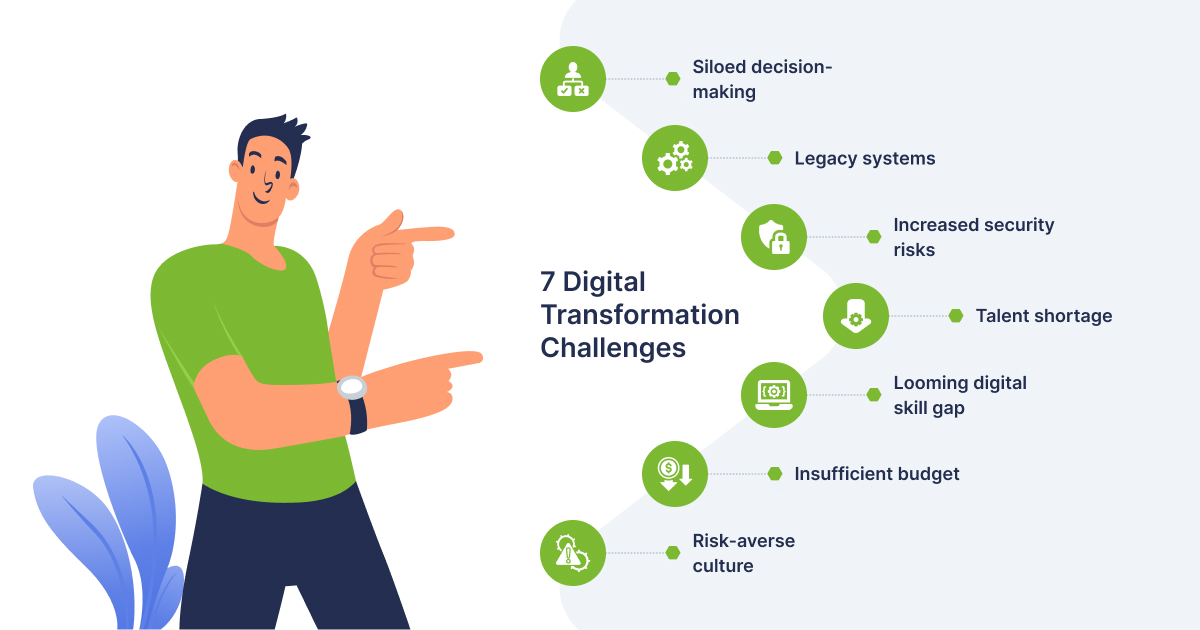7 Digital Transformation Challenges to Overcome in 2024
In the rapidly evolving landscape of technology, businesses face an array of challenges as they embark on the journey of digital transformation. As a business analyst, it is crucial to identify and address these obstacles to ensure a smooth and successful transition. In 2024, organizations are confronted with seven prominent challenges that demand strategic solutions.

1. Siloed Decision-Making
The challenge: Siloed decision-making has been a persistent issue hindering digital transformation. When different departments operate in isolation, it impedes the flow of information and collaboration, leading to fragmented initiatives that lack a unified vision.
The impact on digital transformation: Siloed decision-making can result in redundant technologies, increased costs, and a disjointed user experience. It hampers the organization's ability to harness the full potential of digital transformation.
Digital transformation solutions: To overcome this challenge, organizations must foster a culture of collaboration and transparency. Breaking down silos requires implementing cross-functional teams and fostering open communication channels. Embracing a shared vision for digital transformation ensures that decisions are made collectively, aligning with the overall strategic goals of the organization.
2. Legacy Systems
The challenge: Legacy systems pose a significant hurdle in the digital transformation journey. Outdated technologies hinder agility, scalability, and the integration of modern solutions, impeding the organization's ability to adapt to changing market dynamics.
The impact on digital transformation: Legacy systems limit the speed at which organizations can innovate and respond to market demands. They result in inefficiencies, increased maintenance costs, and a lack of interoperability with new digital tools.
Digital transformation solutions: A phased approach to legacy system modernization is key. Organizations should prioritize critical systems for upgrade or replacement, ensuring that the new technologies seamlessly integrate with existing infrastructure. Investing in robust APIs and middleware facilitates a smoother transition, allowing the organization to gradually retire legacy systems without disrupting operations.
Read also:
How to Digitize Your Business: 4 Strategies for Success
How to Speed Up Your Digital Transformation Through API Development
3. Risk-Averse Organizational Culture
The challenge: A risk-averse culture can paralyze digital transformation initiatives. Fear of failure and a reluctance to embrace change hinder innovation, making it challenging to adopt and implement new technologies.
The impact on digital transformation: A risk-averse culture stifles creativity and inhibits the experimentation necessary for successful digital transformation. It leads to missed opportunities, as organizations are hesitant to explore emerging technologies that could drive competitive advantage.
Digital transformation solutions: Cultivating a culture of innovation requires leadership support and a shift in mindset. Organizations should encourage calculated risk-taking, celebrate failures as learning opportunities, and reward innovative thinking. Establishing a culture that values adaptability and resilience is essential for navigating the uncertainties associated with digital transformation.
Read also: Tips on How to Improve Remote Team Communication Culture
4. Insufficient Budget for Technological Change
The challenge: Budget constraints often impede the execution of comprehensive digital transformation initiatives. Insufficient financial resources limit the organization's ability to invest in cutting-edge technologies and the talent required for successful implementation.
The impact on digital transformation: A lack of budgetary support results in incomplete or delayed digital transformation projects. It hampers the organization's competitiveness, as rivals with more significant financial backing can outpace them in adopting transformative technologies.
Digital transformation solutions: Organizations must prioritize and allocate budgets strategically. Demonstrating the tangible benefits of digital transformation through pilot projects can secure additional funding. Seeking external funding options, such as partnerships or grants, can also supplement internal budgets, ensuring that financial constraints do not become a bottleneck in the transformation journey.
Read also:
How to Find Investments for Healthcare Startups
Lean Startup Methodology Cycle: 4 Steps to Risk-Free Success
How to Build SaaS Application with Small Budget
5. Looming Digital Skill Gap
The challenge: The rapid evolution of technology creates a growing gap between the skills employees possess and the skills required for digital transformation. This skill mismatch can impede the successful adoption of new technologies.
The impact on digital transformation: A shortage of digital skills hinders the effective use of advanced technologies, limiting the organization's ability to leverage the full potential of digital transformation. It can lead to the underutilization of tools and a slower pace of innovation.
Digital transformation solutions: Investing in employee training and development is critical to bridge the digital skill gap. Upskilling and reskilling programs should align with the organization's digital strategy, ensuring that employees acquire the skills necessary for the evolving technological landscape. Collaborating with educational institutions and industry partners can also help in nurturing a pipeline of skilled talent.
6. Shortage of Technological Resources
The challenge: The demand for skilled technological resources often outstrips the available supply. This shortage can impede digital transformation initiatives, as organizations struggle to secure the talent needed for successful implementation.
The impact on digital transformation: A shortage of technological resources can lead to project delays, increased competition for talent, and inflated labor costs. It poses a significant challenge to organizations seeking to build and maintain a skilled workforce for digital transformation.
Digital transformation solutions: To address this challenge, organizations can adopt a multi-faceted approach. This includes partnering with external agencies, leveraging freelancers and contractors, such as dedicated teams, and investing in the development of in-house talent. Creating a positive and inclusive work environment enhances the organization's attractiveness to top tech talent, fostering a culture that attracts and retains skilled professionals.
SDH is a Europe-based team of top-tier talents in business analysis, software engineering and UI/UX design. We’re ready to provide top-notch custom solutions for speeding up your digital transformation. Drop us a line: [email protected].
7. Increased Security Risks
The challenge: As organizations embrace digital transformation, the attack surface for cyber threats expands. The integration of new technologies and increased connectivity introduces security vulnerabilities that must be proactively addressed.
The impact on digital transformation: Security breaches can result in data loss, financial losses, and reputational damage. Concerns about cybersecurity can hinder the adoption of transformative technologies, especially in industries where data privacy and confidentiality are paramount.
Digital transformation solutions: Prioritizing cybersecurity from the outset of digital transformation initiatives is crucial. Implementing robust security measures, conducting regular risk assessments, and staying informed about the latest cybersecurity threats and solutions are essential steps. Collaborating with cybersecurity experts and investing in employee training on security best practices create a resilient security posture.
How to Overcome Digital Transformation Challenges?
Successfully navigating these digital transformation challenges requires a strategic and holistic approach. Here are key steps to overcome these obstacles:
Develop a comprehensive digital transformation strategy:
- Clearly define goals and objectives.
- Prioritize initiatives based on business impact.
- Ensure alignment with overall business strategy.
Promote a culture of innovation:
- Encourage risk-taking and experimentation.
- Foster open communication and collaboration.
- Recognize and reward innovative thinking.
Invest in employee training and development:
- Identify digital skills needed for the future.
- Implement upskilling and reskilling programs.
- Foster a learning culture within the organization.
Strategically allocate budgets:
- Prioritize high-impact projects.
- Demonstrate the ROI of digital transformation.
- Explore external funding options.
Mitigate security risks:
- Integrate security measures from the beginning.
- Stay updated on cybersecurity threats and solutions.
- Collaborate with cybersecurity experts for assessments.
Address legacy systems gradually:
- Prioritize systems for upgrade or replacement.
- Invest in APIs and middleware for interoperability.
- Implement a phased approach to minimize disruptions.
Diversify technological resources:
- Collaborate with external agencies and partners.
- Leverage freelancers and contractors when needed.
- Create an attractive work environment for in-house talent.
Digital transformation partner
Research shows that 60% of surveyed directors of IT companies do not have a ready-made IT modernization program. SDH company offers initiatives for digital transformation, with which business values will be revealed in a new way, the company will gain greater flexibility to accumulate innovative experience.
SDH is a one-stop digital transformation partner headquartered in Germany. We provide sustainable innovations for businesses worldwide, by offering:
- IT consulting
- UI/UX design
- Software engineering
- Cloud migration
- Application modernization
- API development
- Database development, etc.
With 100 strong-skilled specialists in-house, we help fast-growing companies in the US, EU, and MENA to build top-performance digital solutions for business.
Categories
Share
Need a project estimate?
Drop us a line, and we provide you with a qualified consultation.









